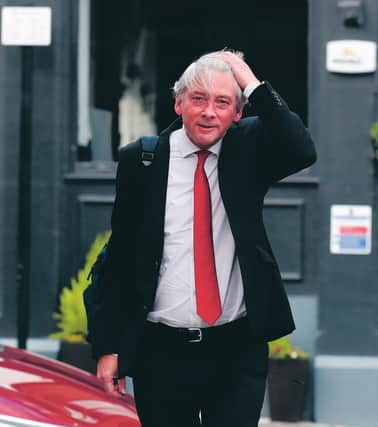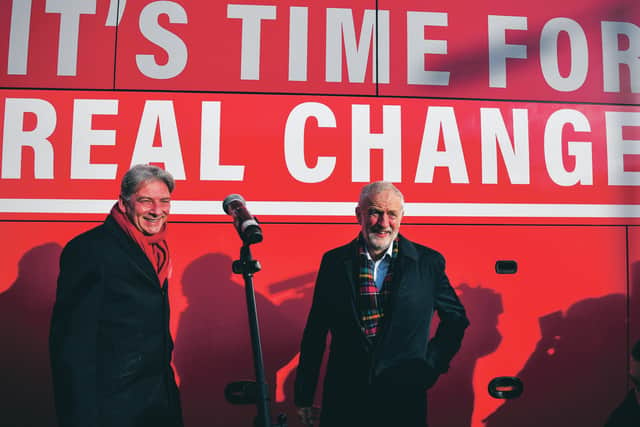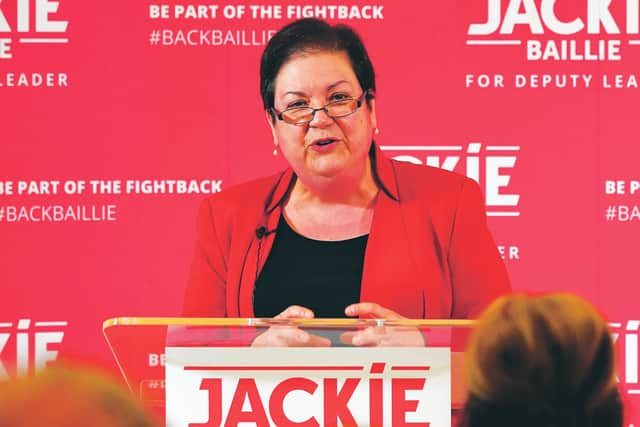Inside Scottish Labour in crisis: ‘He thinks he’s doing well despite the polls’


The Scottish Labour corridor on the first floor of the Scottish Parliament’s MSP building is a quiet place at the best of times. Colleagues tend to remain cloistered in their small offices with their “contemplation window” seats, and heavy oak and glass doors which are generally kept shut. For a small group of MSPs there is little to-ing and fro-ing between each others’ monkish vaults; rather it is like a vow of silence has been taken along the carpeted passageway.
Communication is generally done through WhatsApp groups and chats – aside from weekly, and at times stormy, group meetings – and with that comes the likelihood of encrypted conversations being leaked to the press. And everyone knows that the good ship Solidarity can at times be very leaky.
Advertisement
Hide AdAdvertisement
Hide AdCovid has made this corridor of silence quieter still. Yet it was there, in the very first office which is home to Richard Leonard and his staff – and close to the party’s policy and media unit – that the “men in grey suits” turned up four weeks ago to tell him his time as leader of the party was over and he should go quietly.


They pointed to the grim polls which showed the party at its lowest ebb on 14 per cent with a projected estimate that Labour would return just 18 MSPs at next year’s Holyrood elections – with the potential loss of all three constituencies the party currently holds, resulting in every MSP being returned via the regional lists. They also highlighted Leonard’s own ratings with the public: 56 per cent according to one poll had no opinion on him at all, 36 per cent had an unfavourable opinion and just eight per cent overall saw him in a favourable light – the same percentage as Dominic Cummings. It would not be a comparison that the Scottish Labour leader would appreciate.
According to Labour insiders despite the polls, Leonard seemed surprised by the visit. “He seems to think he’s doing well despite those polls, it’s delusional,” said one. “He thanked us for our bluntness but said he was going nowhere – and he asked who would want to take over? We said there were a number of us who could do a better job than him, but we left it there, telling him we’d be watching closely to see if there would be any change.”
For one of those, James Kelly, change did not come, and after a week which saw his leader mocked in First Minister’s Questions by Nicola Sturgeon as being a “cheerleader” for Boris Johnson, he resigned from his justice role on Labour’s shadow frontbench. Kelly, who was at one point close enough to Leonard to be his chief whip, was supported in his move by fellow MSPS Jenny Marra, Daniel Johnson, and Mark Griffin, who all called on their leader to go. Several Labour peers joined the chorus the following day, as did MP Rachel Reeves, a close ally of UK leader Keir Starmer.
It felt like a head of steam was building, and Leonard would be unable to resist the pressure. Yet, instead of capitulation, he has come out fighting, and Starmer has given him his backing.


Preparing for battle
It’s probably fair to say that ever since his election in 2017, after a rather bruising battle with Anas Sarwar for the job in the wake of Kezia Dugdale’s resignation, Leonard has been preparing for this moment. It could have come after the European elections in May 2019 when the results were the worst for Labour since 1910, winning just a nine per cent share of votes and losing both its MEPs. Instead, it was one of his closest allies in Holyrood, and the Euro campaign manager, Neil Findlay, who resigned his position in the shadow cabinet – and soon afterwards said he would not be seeking re-election as an MSP in 2021.
It mollified some, but just three months later Labour was back in crisis, this time as the result of the then shadow Chancellor John McDonnell’s statements at the Edinburgh Fringe, which turned the party’s stance on being emphatically against a second independence referendum, on its head. The MSP group was furious. McDonnell, they said had undermined Leonard and the party – and this despite him having a press spokesman who knew only to well the ins and outs of the constitutional question. In their eyes it could only have been deliberate and Leonard was compelled to speak to McDonnell and ask him to retract. He didn’t.
Around the same time the long-standing General Secretary of Scottish Labour, Brian Roy left – some say after pressure from Leonard – to be replaced by Michael Sharpe, a former policy worker for the Holyrood Labour group and a long-term fan of Jeremy Corbyn, but with little experience of running a national organisation. Similarly, there were huge changes in the party’s press operation, and ultimately Conrad Landin, a former Morning Star journalist, was appointed Director of Communications, but again with little experience of managing a PR operation.
Advertisement
Hide AdAdvertisement
Hide AdMeanwhile, rumbling along at the back of all of this was the decision by the UK party to withdraw financial and legal support for Leonard’s predecessor Kezia Dugdale in her defamation battle with an independence-supporting political blogger. Leonard refused to help plead her case with Corbyn and the then party General Secretary, Jenny Formby. It drew the left-right lines between him and others in the parliamentary group even more sharply.
By October he had sacked Jackie Baillie and his leadership rival Anas Sarwar, supporters of Dugdale, from his shadow cabinet, despite their experience, and much to the horror of many members who saw them as two of the few Labour MSPs the general public could pick out of a line up.
Fast forward to the snap general election in December. Brexit was the issue which saw the electorate split along In or Out of Europe lines. In Scotland the impact for Labour was the loss of the six MPs it had only just regained in the 2017 general election – including then deputy of the Scottish party, Lesley Laird.
Constant unrest and turmoil
She then produced a scathing report in January which described the party as being weak in organisation and morale. Scotland on Sunday also understands that the Scottish party no longer has control of its finances, the Bath Street headquarters ceding responsibility for its bank accounts to the UK party.
To say then, that there has been constant unrest and turmoil within Scottish Labour over the last three years – and indeed since the independence referendum in 2014 – is to put it mildly. However, the party’s decline in Scotland began long before that. Indeed since the death of the father of devolution, Donald Dewar, Labour has seen its pre-eminence in Scotland slowly slide away.
It is this truth which Leonard’s supporters say should not be forgotten and should not result in his resignation. He is the ninth leader in 20 years and is not personally responsible for the decline of Scotland’s “natural party of government” to third place in Holyrood behind the Conservatives. That did not happen on his watch. More they say, the timing of the resignation demands could not be worse, and is entirely self-centred of those who fear they could be casualties at next year’s elections.
To his detractors Leonard is failing to do anything to change the party’s position, and needs to go so that what could be “a near extinction event” next year, doesn’t happen. The potential consequences if he doesn’t is that come May there will be nothing left of Scottish Labour to rebuild.
Daniel Johnson, one of the band of four MSPs who have demanded Leonard resign, says: “We’ve reached a point in our decline where we have to do something to stop it. This is not something we’ve done lightly but given the context of the worst result in a general election in Scotland in our history and no suggestion of alternative or change to tackle the issues that have led us to these results, then we’ve felt the need to speak out publicly.
Advertisement
Hide AdAdvertisement
Hide Ad“Richard had been told by many that his lack of cut-through is a big problem. But this is not just the feeling in the group, there is a strength of feeling across the party that he’s had three years and it’s not worked.
“I’m someone who wants to be, and tries to be, constructive but when help and suggestions are not acknowledged and nothing happens then it’s incredibly frustrating. We’re at the point where the party could achieve a result next year I don’t think we can recover from. I can’t countenance that happening, we need to do something.
“This is about the future of the party and we feel we’ve been left with no choice.”
Other Labour insiders believe that Leonard is not up to the job – pointing to his performances at First Minister’s Questions, the one place where the public can see and hear the Scottish party leaders every week. “He’s a disaster – he can’t ask a concise question, he has no comeback to Sturgeon’s put downs, he peddles lines supplied by unions that the general public have no interest in,” says one. “FMQs is hard and it just looks like he’s not putting in the work, and the party members deserve to be able to watch it without cringing. For a man of the people, he severely lacks the common touch.”
Another says: “He could walk on wet sand and not leave an impression. It’s utterly depressing. It doesn’t matter how good his policies might be, next to Sturgeon he’s invisible – it’s little wonder the public don’t know who he is.”
Such criticism is harsh, however it’s not just the so-called moderates who feel frustrated with Labour’s current position. Johnson’s fellow MSP and Leonard supporter Elaine Smith, who is on the left of the party, admits she could have wept when Kelly resigned.
“Here we are again,” she says. “Labour in crisis. It’s incredibly upsetting, and I think more so for our members and our staff who are working hard – at home – to try and make sure we can challenge the government on its Covid response, on its programme for government, and yet we’re all now having to look at internal party issues again.
“Of course people are frustrated. There’s a huge challenge for Scottish Labour and we’ve known that for some time. We’ve been on a path of decline for years and yet we change leaders and change them again, and it does nothing for our standing. I don’t think changing leader now will be a panacea for next year.”
Advertisement
Hide AdAdvertisement
Hide AdSmith is the Labour group’s business manager in Holyrood and is aware that communication between MSPs had broken down – even before Covid. She had been planning changes to try and bring people back together, but the pandemic had put paid to that. “But we were getting on the front foot in policy terms. We had a summer focus on jobs and the national care service, and these have chimed with the public – so much so the SNP government has now adopted our policies, and we now have to work hard to make sure they deliver.
“Ironically this coup, which apparently stems from Richard not having a high enough profile, has given him just that. He’s been on TV, on the radio, discussing this, but also putting forward our policies. He’s shown his mettle as a leader under pressure, and the shadow cabinet is behind him.”
Neil Findlay, who has a reputation within the party for failing to pull his punches, has declared the “coup” as “treachery with a snarl”. For him, the root of the dis-satisfaction is fear that people will not be returned to Holyrood next year because of changes Leonard wants to make to the selection process – putting a woman at the top of every regional list, aside from his own, which if polls are correct, would leave those further down the list looking for new employment.
Like Smith, though, he refuses to countenance Labour’s electoral misfortunes are Leonard’s fault; rather he points the finger at the constitutional question.
“Richard has made mistakes, yes, and would be the first to admit it, but those calling for his head have made far bigger mistakes over the last 20 years and maybe a bit of self-reflection by them is what’s required.
“Right now we’re in a situation where thousands of our fellow citizens have died, elderly loved ones treated abominably, and a jobs crisis and these are the issues we have to talk about but we can’t because the constitution is everything. There are people who haven’t got a crust of bread, and thousands are dead, yet none of that seems to matter. Labour must have a coherent constitutional position and without that you don’t get a kick of the ball – in fact you don’t even get on the pitch.”
The constitutional question is admitted across Scottish Labour to be the real problem. For those who have lost confidence in Leonard though, it doesn’t help if the party leader has in the past appeared to stumble over the party’s policy, and as during the McDonnell chaos of last year, seems unable to defend it internally.
Former member of the party’s Scottish Executive Committee and Leonard’s leadership campaign press man, Stephen Low, says Scottish politics is determined by two nationalisms – Scottish and British – and any Labour leader will get squeezed.
Advertisement
Hide AdAdvertisement
Hide Ad“I think we should have a distinctively negative relationship with both nationalisms,” he says. “If you’re a party which is about social change at a time when people are consumed with nationalism, then you’re in a difficult place. Frankly, no Labour leader has been able to cut through that.”
He adds: “In the last 13 years the parliamentary Labour party has not learned how to oppose properly. For a long time there was a feeling it wasn’t “fair” that they were having to ask questions rather than answer them. They were just about getting a handle on it when they got bumped to third place. To be honest, we’ve been in denial about our position for the entirety of devolution and the parliamentary group have to take the bulk of the responsibility for our declining electoral fortunes because they’ve been the ones running the show. Richard has been given an opportunity to change things, but they’ve never wanted him. But they’re not kingmakers. They want to party like it’s 1997 but those days are over.”
Many on the left are pointing to current party deputy Jackie Baillie as being behind the coup, yet she has not commented publicly on this week’s events. Neither has Anas Sarwar, who some believe could still win the backing of the party to replace Leonard, although privately he has said the 2017 campaign experience left him bruised and far less keen on the role.
More resignations to come
A Labour insider says that more is yet to come in the wake of Kelly’s resignation and the other calls for Leonard to go. But there has been surprise at the leader’s intransigence. “People keep saying Richard is decent and honourable, but if he really was he would go and not destroy the party he says he loves. He’s also lost support of the union which he worked for for 20 years, and there are many others who are privately saying his time is up. If he won’t listen to MSPs and members, perhaps he will listen to his own union.”
It’s a lack of listening which is a theme in the criticisms of Leonard. He is said to surround himself only by those who agree with his every word, and has no-one close to offer constructive criticism. “Which is what you need to be a good leader. You need challenge. There’s no way Starmer is surrounded by nodding dogs,” says one.
With Leonard digging in, it is still entirely possible the “coup” will peter out. One former Labour spin doctor says that no matter the leader, the 2021 elections should see the party focus on becoming the main opposition again given the polls predict an SNP landslide.
“The MSPs have to stop thinking they’re going to be in government anytime soon. The prize is to oust the Tories as the main opposition. That’s where the focus should be – on being the party which says to the electorate, who do you trust more to hold the SNP to account – us or the Tories? Get that right, then the party can rebuild. If Richard stays and can be persuaded to follow that course of action then things could change. But he needs to take people with him, and if he can’t do that, then he’s in the wrong job.”
Comments
Want to join the conversation? Please or to comment on this article.